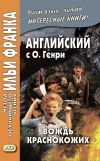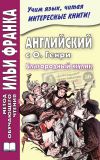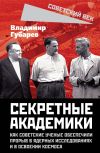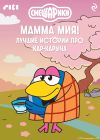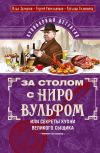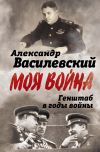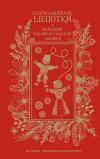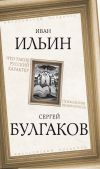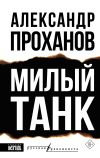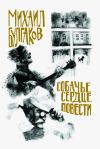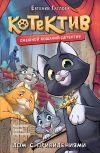Текст книги "Английский с Джеромом К. Джеромом. Сюрприз мистера Милберри и другие истории / Jerome К. Jerome. The Surprise of Mr. Milberry"
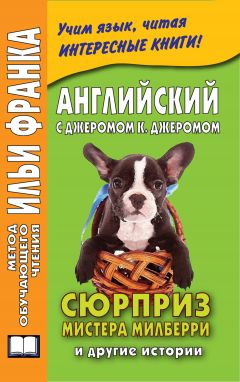
Автор книги: Джером Джером
Жанр: Иностранные языки, Наука и Образование
Возрастные ограничения: +16
сообщить о неприемлемом содержимом
Текущая страница: 2 (всего у книги 11 страниц) [доступный отрывок для чтения: 2 страниц]
linen-basket ["lɪnɪn'bɑ:skɪt], touch [tʌʧ], knuckles ['nʌk(ǝ)lz], knocked [nɒkt], balustrade ['bælǝ'streɪd], nervous ['nɜ:vǝs], excited [ɪk'saɪtɪd]
He came by the 'bus that meets the 4.52. He'd a handbag and a sort of hamper: it looked to me like a linen-basket. He wouldn't let the Boots touch the hamper, but carried it up into his bedroom himself. He carried it in front of him by the handles, and grazed his knuckles at every second step. He slipped going round the bend of the stairs, and knocked his head a rattling good thump against the balustrade; but he never let go that hamper – only swore and plunged on. I could see he was nervous and excited, but one gets used to nervous and excited people in hotels.
Whether a man's running away from a thing (убегает ли человек от чего-либо; to run – бегать, бежать; убегать; thing – вещь, предмет; нечто, что-то), or running after a thing (или же гонится за чем-то), he stops at a hotel on his way (он останавливается в гостинице на своем пути; way – путь, дорога); and so long as he looks as if he could pay his bill (и если он выглядит так, будто может заплатить по счету; so long as – /до тех пор/ пока; поскольку, если только) one doesn't trouble much about him (о нем много не беспокоишься = на него не обращаешь особого внимания; to trouble – тревожить/ся/, беспокоить/ся/; trouble – тревога, волнение, беспокойство). But this man interested me (но этот человек заинтересовал меня): he was so uncommonly young and innocent-looking (он был столь необыкновенно молод и простодушен на вид; innocent – невинный; наивный, простодушный). Besides, it was a dull hole of a place after the sort of jobs I'd been used to (кроме того, это место было скучной дырой после тех /видов/ работ, к которым я привык; dull – тупой, глупый; скучный, унылый; hole – дыра; отверстие; захолустье; place – место; город, местечко; job – работа; место работы, должность); and when you've been doing nothing for three months (а когда вы ничего не делали три месяца) but waiting on commercial gents as are having an exceptionally bad season (а только обслуживали коммерсантов: «торговых джентльменов», у которых исключительно плохой сезон; to wait on smb. – прислуживать, служить кому-л.; commercial – торговый, коммерческий; gent = gentleman; to except – исключать; season – время года; сезон, период), and spoony couples with guide-books (и влюбленные парочки с путеводителями; spoony – /разг./ влюбленный без ума; to spoon – /разг./ обниматься, миловаться /о влюбленных/; ворковать; guide – проводник, гид; путеводитель; руководство; book – книга), you get a bit depressed (вы немного приунываете; to get – доставать, получать; приходить в какое-л. положение, состояние; bit – кусочек; небольшое количество; to depress – подавлять, угнетать; приводить в уныние), and welcome any incident, however slight (и рады любому событию, каким бы незначительным /оно ни было/; to welcome – приветствовать /гостя/; радушно принимать; incident – случай, событие, происшествие; slight – тонкий, худощавый; легкий, незначительный), that promises to be out of the common (которое обещает быть незаурядным; common – общий; обычный, заурядный).
hotel [hǝʋ'tel], doesn't ['dʌznt], innocent ['ɪnǝs(ǝ)nt], commercial [kǝ'mɜ:ʃ(ǝ)l], exceptionally [ɪk'sepʃ(ǝ)n(ǝ)lɪ], guide [ɡaɪd], incident ['ɪnsɪd(ǝ)nt]
Whether a man's running away from a thing, or running after a thing, he stops at a hotel on his way; and so long as he looks as if he could pay his bill one doesn't trouble much about him. But this man interested me: he was so uncommonly young and innocent-looking. Besides, it was a dull hole of a place after the sort of jobs I'd been used to; and when you've been doing nothing for three months but waiting on commercial gents as are having an exceptionally bad season, and spoony couples with guide-books, you get a bit depressed, and welcome any incident, however slight, that promises to be out of the common.
I followed him up into his room (я последовал за ним в его номер), and asked him if I could do anything for him (и спросил, могу ли я что-нибудь сделать для него). He flopped the hamper on the bed with a sigh of relief (он плюхнул корзину на кровать со вздохом облегчения; to flop – /разг./ шлепнуться, плюхнуться; бить /крыльями/; швырнуть), took off his hat (снял шляпу; to take off), wiped his head with his handkerchief (вытер голову платком), and then turned to answer me (и затем обернулся, чтобы ответить мне; to turn – поворачивать/ся/).
“Are you a married man?” says he (вы женаты: «женатый мужчина»? – говорит он).
It was an odd question to put to a waiter (было странно такой вопрос задавать официанту; odd – нечетный; странный, необычный; to put – класть, ставить; задавать /вопрос/), but coming from a gent there was nothing to be alarmed about (но так как он исходил от джентльмена, тревожиться было не о чем; to alarm – поднять тревогу, дать сигнал тревоги; встревожить; alarm – тревога, сигнал опасности).
“Well, not exactly (ну, не совсем; exactly – точно; именно, как раз; да, совершенно верно /выражение согласия/; exact – точный; верный),” I says – I was only engaged at that time (я был только помолвлен в то время; to engage – нанимать на работу; брать на себя обязательство; обручаться), and that not to my wife, if you understand what I mean (и не с моей женой, если вы понимаете, что я имею в виду) – “but I know a good deal about it (но я многое знаю об этом; a good deal – значительное количество, очень много; много, изрядно; deal – некоторое количество),” I says, “and if it's a matter of advice (и если это дело совета = если вам нужен совет…) —”
could [kʋd], relief [rɪ'li:f], handkerchief ['hæŋkǝʧɪf], alarmed [ǝ'lɑ:md], engaged [ɪn'ɡeɪʤd]
I followed him up into his room, and asked him if I could do anything for him. He flopped the hamper on the bed with a sigh of relief, took off his hat, wiped his head with his handkerchief, and then turned to answer me.
“Are you a married man?” says he.
It was an odd question to put to a waiter, but coming from a gent there was nothing to be alarmed about.
“Well, not exactly,” I says – I was only engaged at that time, and that not to my wife, if you understand what I mean – “but I know a good deal about it,” I says, “and if it's a matter of advice – ”
“It isn't that,” he answers, interrupting me (это не то = дело не в этом, – отвечает он, перебивая меня; to interrupt – прерывать, обрывать; перебивать /говорящего/); “but I don't want you to laugh at me (но я не хочу, чтобы вы смеялись надо мной). I thought if you were a married man (я думал, если вы женатый человек) you would be able to understand the thing better (то могли бы лучше понять это дело). Have you got an intelligent woman in the house (у вас есть в этом доме умная женщина; intelligent – умный, сообразительный, смышленый)?”
“We've got women (у нас есть женщины),” I says. “As to their intelligence, that's a matter of opinion (что касается их ума, это спорный вопрос: «дело мнения»; opinion – взгляд, мнение; оценка); they're the average sort of women (они – средний тип женщин = обыкновенные женщины). Shall I call the chambermaid (позвать горничную; to call – кричать; звать, вызывать; chamber – /уст./ комната /в жилом доме/; спальня; горница; maid – служанка, горничная)?”
“Ah, do (о, позовите),” he says. “Wait a minute,” he says (подождите минутку, – говорит он); “we'll open it first (сначала /мы/ откроем это; first – первый; сперва, сначала).”
He began to fumble with the cord (он начал возиться с веревкой; to fumble – неловко, неумело обращаться /с чем-л./; мять, вертеть в руках; cord – тонкая веревка, шнур), then he suddenly lets go and begins to chuckle to himself (потом вдруг выпускает ее /из рук/ и начинает посмеиваться /про себя/; suddenly – внезапно, вдруг, неожиданно; to chuckle – посмеиваться, хихикать).
answers ['ɑ:nsǝz], laugh [lɑ:f], average ['æv(ǝ)rɪʤ], minute ['mɪnɪt]
“It isn't that,” he answers, interrupting me; “but I don't want you to laugh at me. I thought if you were a married man you would be able to understand the thing better. Have you got an intelligent woman in the house?”
“We've got women,” I says. “As to their intelligence, that's a matter of opinion; they're the average sort of women. Shall I call the chambermaid?”
“Ah, do,” he says. “Wait a minute,” he says; “we'll open it first.”
He began to fumble with the cord, then he suddenly lets go and begins to chuckle to himself.
“No,” he says, “you open it (нет, – говорит, – вы открывайте). Open it carefully; it will surprise you (открывайте осторожно; это вас удивит; careful – заботливый, внимательный; осторожный; care – забота; внимание, осторожность).”
I don't take much stock in surprises myself (сам я не очень-то доверяю сюрпризам; to take stock in smth. – /разг./ верить во что-л.; придавать значение чему-л.; stock – запас; репутация, имя; /разг./ доверие, вера). My experience is that they're mostly unpleasant (мой /жизненный/ опыт говорит, что они главным образом неприятные; mostly – главным образом; большей частью, обычно; pleasant – приятный; милый, славный).
“What's in it?” I says (что в ней? – спрашиваю).
“You'll see if you open it (увидите, если откроете ее),” he says: “it won't hurt you (это вам /никак/ не повредит; won't = will not; to hurt – причинять боль, вред, ущерб).” And off he goes again, chuckling to himself (и отходит снова, посмеиваясь; to go off – уходить, уезжать).
“Well,” I says to myself (ну, – говорю я себе/думаю про себя), “I hope you're a harmless specimen (надеюсь, вы безобидный субъект; specimen – образец; экземпляр; /разг., ирон./ тип, субъект).” Then an idea struck me (тут одна мысль пришла мне в голову; idea – идея, мысль; to strike – ударять, бить; поражать; приходить в голову), and I stopped with the knot in my fingers (и я остановился с узлом в пальцах).
“It ain't a corpse,” I says, “is it (это не труп, не так ли; ain't = /прост., разг./ am not, is not, are not, have not или has not)?”
carefully ['keǝf(ǝ)lɪ], experience [ɪk'spɪ(ǝ)rɪǝns], unpleasant [ʌn'plez(ǝ)nt], hurt [hɜ:t], specimen ['spesɪmǝn], knot [nɒt], corpse [kɔ:ps]
“No,” he says, “you open it. Open it carefully; it will surprise you.”
I don't take much stock in surprises myself. My experience is that they're mostly unpleasant.
“What's in it?” I says.
“You'll see if you open it,” he says: “it won't hurt you.” And off he goes again, chuckling to himself.
“Well,” I says to myself, “I hope you're a harmless specimen.” Then an idea struck me, and I stopped with the knot in my fingers.
“It ain't a corpse,” I says, “is it?”
He turned as white as the sheet on the bed (он повернулся, бледный как полотно, на кровати; white – белый; бледный; sheet – простыня; полотно, холст), and clutched the mantelpiece (и вцепился в каминную полку; to clutch – схватить/ся/, стиснуть; mantelpiece – каминная доска; каминная полка; piece – кусок; часть). “Good God! don't suggest such a thing (боже мой! не говорите такого; good God! – боже мой! боже милостивый!; вот те на! /выражает удивление, досаду, гнев и т. д./; to suggest – предлагать, советовать; выдвигать предположение; намекать, наводить /на мысль/),” he says; “I never thought of that (я и не думал об этом; never – никогда; ни разу; /эмоц. – усил./ нисколько, никоим образом). Open it quickly (откройте ее скорее; quickly – быстро, скоро; quick – быстрый, скорый).”
“I'd rather you came and opened it yourself, sir (уж лучше бы вам подойти и самому ее открыть, сэр; rather – лучше, скорее, охотнее; I had rather, I would rather, I'd rather – я предпочел бы…; лучше уж я…),” I says. I was beginning not to half like the business (это дело начинало мне ужасно не нравиться; not half – /разг./ совсем не, вовсе не; очень сильно, ужасно; half – половина; наполовину; /разг., усил./ очень, ужасно; отнюдь, совсем не).
“I can't,” he says, “after that suggestion of yours (не могу, – говорит он, – после того вашего предположения; suggestion – предложение; намек; предположение) – you've put me all in a tremble (вы поместили = привели меня всего в дрожь = от ваших слов я весь дрожу). Open it quick, man (скорее откройте ее, приятель; man – человек, мужчина; /разг./ парень, приятель); tell me it's all right (скажите мне, что все хорошо; right – правый; правильный; здоровый, в хорошем состоянии; исправный).”
Well, my own curiosity helped me (так вот, мое собственное любопытство помогло мне). I cut the cord (я разрезал веревку; to cut – /раз/резать), threw open the lid (откинул крышку; to throw – бросать/ся/, кидать/ся/; to throw open – распахивать /дверь, окно/), and looked in (и заглянул внутрь). He kept his eyes turned away (он держал свои глаза повернутыми в сторону = смотрел в сторону; to turn away – отворачивать/ся/), as if he were frightened to look for himself (словно боялся сам посмотреть; frightened – испуганный, напуганный; to frighten – пугать).
mantelpiece ['mæntlpi:s], half [hɑ:f], threw [θru:], frightened ['fraɪtnd]
He turned as white as the sheet on the bed, and clutched the mantelpiece. “Good God! don't suggest such a thing,” he says; “I never thought of that. Open it quickly.”
“I'd rather you came and opened it yourself, sir,” I says. I was beginning not to half like the business.
“I can't,” he says, “after that suggestion of yours – you've put me all in a tremble. Open it quick, man; tell me it's all right.”
Well, my own curiosity helped me. I cut the cord, threw open the lid, and looked in. He kept his eyes turned away, as if he were frightened to look for himself.
“Is it all right (все благополучно)?” he says. “Is it alive (он жив; alive – живой, в живых)?”
“It's about as alive (он примерно так жив),” I says, “as anybody'll ever want it to be, I should say (как любой будет всегда хотеть = как дай бог всякому, я думаю; I should say – я думаю, я полагаю).”
“Is it breathing all right (он дышит как следует)?” he says.
“If you can't hear it breathing (если вы не можете услышать, как он дышит),” I says, “I'm afraid you're deaf (боюсь, вы глухи; afraid – испуганный, напуганный; боящийся).”
You might have heard its breathing outside in the street (можно было услышать его дыхание /даже/ на улице; outside – снаружи; вне дома, на улице). He listened, and even he was satisfied (он прислушался, и даже он был доволен; to listen – слушать; выслушивать; satisfied – довольный, удовлетворенный; to satisfy – удовлетворять; радовать; убеждать, доказывать).
“Thank Heaven!” he says (слава богу: «спасибо небу»! – говорит он), and down he plumped in the easy-chair by the fireplace (и опустился в мягкое кресло у камина; easy-chair – мягкое, удобное кресло; easy – легкий; удобный, приятный; chair – стул; кресло; fireplace – камин, очаг; fire – огонь; печь, камин; place – место).
ever ['evǝ], breathing ['bri:ðɪŋ], deaf [def], listened ['lɪs(ǝ)nd], Heaven ['hev(ǝ)n]
“Is it all right?” he says. “Is it alive?”
“It's about as alive,” I says, “as anybody'll ever want it to be, I should say.”
“Is it breathing all right?” he says.
“If you can't hear it breathing,” I says, “I'm afraid you're deaf.”
You might have heard its breathing outside in the street. He listened, and even he was satisfied.
“Thank Heaven!” he says, and down he plumped in the easy-chair by the fireplace.
“You know, I never thought of that,” he goes on (знаете, я даже и не думал об этом, – продолжает он; to go on – идти дальше; продолжать). “He's been shut up in that basket for over an hour (он был заперт в этой корзине более часа; to shut up – плотно закрывать; запирать /что-л. где-л./; держать взаперти), and if by any chance he'd managed to get his head entangled in the clothes (и если бы он случайно запутался головкой в одежде; by chance – случайно; chance – случайность; случай; to manage – руководить, управлять; ухитриться, суметь сделать /что-л./; to entangle – запутывать; to tangle – запутывать/ся/; tangle – спутанный клубок; путаница) – I'll never do such a fool's trick again (я никогда больше не сделаю такой глупости; trick – обман; шутка, шалость; глупый поступок)!”
“You're fond of it (вы его любите; fond – любящий)?” I says.
He looked round at me (он обернулся на меня; to look round – оглядываться кругом). “Fond of it,” he repeats (люблю ли его, – повторяет он). “Why, I'm his father (да я его отец).” And then he begins to laugh again (и затем он опять начинает смеяться).
“Oh!” I says (вот как, – говорю). “Then I presume I have the pleasure of addressing Mr. Coster King (тогда, полагаю, я имею удовольствие говорить с мистером Костэром Кингом; to presume – /пред/полагать/; допускать; to address – обращаться /к кому-л./; говорить /с кем-л./; Mr. = Mister; king – король)?”
“Coster King?” he answers in surprise (Костэром Кингом? – отвечает он в удивлении = удивленно). “My name's Milberry (моя фамилия Милберри; name – имя; фамилия).”
hour ['aʋǝ], chance [ʧɑ:ns], presume [prɪ'zju:m], pleasure ['pleʒǝ]
“You know, I never thought of that,” he goes on. “He's been shut up in that basket for over an hour, and if by any chance he'd managed to get his head entangled in the clothes – I'll never do such a fool's trick again!”
“You're fond of it?” I says.
He looked round at me. “Fond of it,” he repeats. “Why, I'm his father.” And then he begins to laugh again.
“Oh!” I says. “Then I presume I have the pleasure of addressing Mr. Coster King?”
“Coster King?” he answers in surprise. “My name's Milberry.”
I says: “The father of this child, according to the label inside the cover (отец этого ребенка, судя по ярлыку на внутренней стороне крышки; according to – в соответствии с, согласно, по; label – ярлык, этикетка, наклейка; inside – внутри, в; cover – крышка, колпак; покрывало), is Coster King out of Starlight (Костэр Кинг, отпрыск Старлайта; out of – указывает на происхождение животного; starlight – звездный; star – звезда; light – свет), his mother being Jenny Deans out of Darby the Devil (его мать – Дженни Динс, отпрыск Дарби Дьявола).”
He looks at me in a nervous fashion (он смотрит на меня боязливо: «нервным образом»; fashion – образ; манера /поведения/, вид), and puts the chair between us (и ставит стул между нами). It was evidently his turn to think as how I was mad (очевидно, пришел его черед думать, что я сумасшедший; evident – очевидный, явный, ясный; turn – поворот, изгиб; очередь; how – как, насколько). Satisfying himself, I suppose, that at all events I wasn't dangerous (убедив себя = убедившись, полагаю, что я во всяком случае не опасен; to suppose – полагать, думать; предполагать, допускать; at all events – во всяком случае, как бы то ни было; event – событие; случай; dangerous – опасный; danger – опасность; угроза), he crept closer till he could get a look inside the basket (он стал медленно придвигаться ближе, пока не смог заглянуть: «получить взгляд» в корзину; to creep – ползать; подкрадываться; ползти, медленно двигаться; close – близкий; близко). I never heard a man give such an unearthly yell in all my life (никогда за всю мою жизнь я не слышал, чтобы мужчина издавал такой неземной вопль; to give – давать; отдавать; производить /какое-л. действие, звук/; earth – земля; yell – пронзительный крик, вопль). He stood on one side of the bed and I on the other (он стоял по одну сторону кровати, а я – по другую; to stand – стоять; side – поверхность, сторона; край, бок). The dog, awakened by the noise (собака, разбуженная шумом; to awaken – пробуждать/ся/), sat up and grinned (села и оскалилась; to sit up – садиться /из лежачего положения/; to sit – сидеть; to grin – ухмыляться; скалить зубы; оскалиться), first at one of us and then at the other (сначала на одного из нас, потом на другого). I took it to be a bull-pup of about nine months old (я разглядел, что это щенок бульдога примерно девяти месяцев; to take – брать; принимать; полагать, считать; bull – бык; = bulldog – бульдог; old – старый; такого-то возраста), and a fine specimen for its age (и отличный экземпляр для своего возраста; fine – хороший, прекрасный, превосходный).
cover ['kʌvǝ], evidently ['evɪd(ǝ)ntlɪ], dangerous ['deɪnʤǝrǝs], heard [hɜ:d], unearthly [ʌn'ɜ:θlɪ], noise [nɔɪz]
I says: “The father of this child, according to the label inside the cover, is Coster King out of Starlight, his mother being Jenny Deans out of Darby the Devil.”
He looks at me in a nervous fashion, and puts the chair between us. It was evidently his turn to think as how I was mad. Satisfying himself, I suppose, that at all events I wasn't dangerous, he crept closer till he could get a look inside the basket. I never heard a man give such an unearthly yell in all my life. He stood on one side of the bed and I on the other. The dog, awakened by the noise, sat up and grinned, first at one of us and then at the other. I took it to be a bull-pup of about nine months old, and a fine specimen for its age.
“My child!” he shrieks, with his eyes starting out of his head (мое дитя! – кричит он, и глаза у него лезут на лоб: «из головы»; to shriek – пронзительно кричать, вопить; to start – начинать/ся/; сдвигать/ся/ с места, расшатывать/ся/; вылезать, выступать), “That thing isn't my child (эта тварь – не мое дитя). What's happened (что случилось; to happen – случаться, происходить)? Am I going mad (я схожу с ума)?”
“You're on that way,” I says, and so he was (вы на этом пути = вы к этому идете, – говорю я, и таким он и был). “Calm yourself (успокойтесь: «успокойте себя»; to calm – успокаивать/ся/; calm – спокойный, тихий),” I says; “what did you expect to see (что вы ожидали увидеть)?”
“My child,” he shrieks again (моего ребенка! – снова кричит он); “my only child – my baby (моего единственного ребенка – мое дитя)!”
“Do you mean a real child (вы имеете в виду настоящее дитя)?” I says, “a human child (человеческого ребенка)?” Some folks have such a silly way of talking about their dogs (у некоторых людей такая глупая манера говорить о своих собаках; silly – глупый; дурацкий; нелепый) – you never can tell (что никогда не поймешь; to tell – говорить; рассказывать; различать; определять).
“Of course I do (конечно, настоящего),” he says; “the prettiest child you ever saw in all your life (самого прелестного ребенка, какого вы когда-либо видели в жизни; pretty – милый, прелестный; симпатичный, хорошенький /о женщине или ребенке/), just thirteen weeks old on Sunday (только тринадцать недель /ему исполнилось/ в воскресенье; just – именно, как раз, точно /о времени, месте, образе действия/; только что; едва; всего лишь). He cut his first tooth yesterday (у него прорезался первый зубик вчера; to cut – резать; резаться /о зубах/).”
shrieks [ʃri:ks], calm [kɑ:m], human ['hju:mǝn], folks [fǝʋks], Sunday ['sʌndɪ], yesterday ['jestǝdɪ]
“My child!” he shrieks, with his eyes starting out of his head, “That thing isn't my child. What's happened? Am I going mad?”
“You're on that way,” I says, and so he was. “Calm yourself,” I says; “what did you expect to see?”
“My child,” he shrieks again; “my only child – my baby!”
“Do you mean a real child?” I says, “a human child?” Some folks have such a silly way of talking about their dogs – you never can tell.
“Of course I do,” he says; “the prettiest child you ever saw in all your life, just thirteen weeks old on Sunday. He cut his first tooth yesterday.”
The sight of the dog's face seemed to madden him (вид собачьей морды, казалось, приводил его в бешенство; face – лицо; морда /животного/; to seem – казаться, представляться; to madden – сводить с ума; бесить, доводить до бешенства). He flung himself upon the basket (он бросился к корзине; to fling – метать, бросать; кидаться, бросаться), and would, I believe, have strangled the poor beast (и, думаю, задушил бы бедную тварь; to believe – верить; полагать, считать; beast – зверь, животное) if I hadn't interposed between them (если бы я не встал между ними; to interpose – вставлять, помещать /что-л./ между /чем-л./; вклиниваться).
“'Tain't the dog's fault (это не собачья вина; 'tain't = it ain't; fault – дефект, недостаток; вина, проступок),” I says; “I daresay he's as sick about the whole business as you are (полагаю, ему так же плохо из-за всего этого дела, как и вам; I daresay – полагаю, думаю, осмелюсь сказать; to dare – осмеливаться; sick – чувствующий тошноту; испытывающий скуку, раздражение; whole – весь, целый). He's lost, too (он тоже потерялся; lost – потерянный, пропавший; потерявшийся; to lose – терять; потеряться, пропасть). Somebody's been having a lark with you (кто-то сыграл с вами шутку; lark – жаворонок; /разг./ шутка, проказа). They've took your baby out and put this in (/они/ вытащили вашего ребенка и положили /в корзину/ этого…) – that is, if there ever was a baby there (то есть, если там вообще был ребенок).”
“What do you mean (что вы хотите сказать/что вы имеете в виду)?” he says.
interposed [,ɪntǝ'pǝʋzd], fault [fɔ:lt], whole [hǝʋl], lark [lɑ:k]
The sight of the dog's face seemed to madden him. He flung himself upon the basket, and would, I believe, have strangled the poor beast if I hadn't interposed between them.
“'Tain't the dog's fault,” I says; “I daresay he's as sick about the whole business as you are. He's lost, too. Somebody's been having a lark with you. They've took your baby out and put this in – that is, if there ever was a baby there.”
“What do you mean?” he says.
“Well, sir,” I says, “if you'll excuse me (ну, сэр, – говорю, – /если/ вы меня извините), gentlemen in their sober senses don't take their babies about in dog-baskets (/но/ джентльмены в здравом уме не носят /с собой/ детей в собачьих корзинах; sober – трезвый; здравомыслящий, здравый; sense – чувство, ощущение; разум; здравый смысл). Where do you come from (откуда вы; to come – приходить, приезжать; иметь происхождение, быть родом)?”
“From Banbury (из Банбери),” he says; “I'm well known in Banbury (я хорошо известен/меня хорошо знают в Банбери).”
“I can quite believe it (вполне могу этому поверить; quite – вполне, совсем, совершенно),” I says; “you're the sort of young man that would be known anywhere (вы молодой человек такого типа = такой молодой человек, которого везде бы знали).”
“I'm Mr. Milberry (я мистер Милберри),” he says, “the grocer, in the High Street (бакалейщик с Хай-Стрит; High Street – главная улица: «высокая улица» /название главной улицы во многих городах/).”
“Then what are you doing here with this dog (тогда что вы делаете здесь с этой собакой)?” I says.
excuse /гл./ [ɪk'skju:z], senses ['sensɪz], quite [kwaɪt], young [jʌŋ], anywhere ['enɪweǝ], grocer ['ɡrǝʋsǝ]
“Well, sir,” I says, “if you'll excuse me, gentlemen in their sober senses don't take their babies about in dog-baskets. Where do you come from?”
“From Banbury,” he says; “I'm well known in Banbury.”
“I can quite believe it,” I says; “you're the sort of young man that would be known anywhere.”
“I'm Mr. Milberry,” he says, “the grocer, in the High Street.”
“Then what are you doing here with this dog?” I says.
“Don't irritate me,” he answers (не сердите меня, – отвечает он; to irritate – раздражать, сердить). “I tell you I don't know myself (говорю вам, я сам не знаю). My wife's stopping here at Warwick, nursing her mother (моя жена гостит здесь, в Уорике, ухаживает за своей матерью; to stop – останавливать/ся/; останавливаться /где-л. на время/, гостить; to nurse – кормить, выкармливать /ребенка/; нянчить; ухаживать за больным; быть сиделкой), and in every letter she's written home for the last fortnight she's said (и в каждом письме, которое она написала домой за последние две недели, говорит; to write – писать), ‘Oh, how I do long to see Eric (о, как же я хочу увидеть Эрика; to long – очень хотеть, страстно желать)! If only I could see Eric for a moment (если бы я только могла увидеть Эрика на минутку)!'”
“A very motherly sentiment,” I says, “which does her credit (очень материнское чувство, которое делает ей честь; credit – вера, доверие; хорошая репутация; заслуга, честь).”
“So this afternoon,” continues he (и вот сегодня днем, – продолжает он; afternoon – время после полудня; дневное время; noon – полдень), “it being early-closing day (так как был короткий рабочий день; early-closing day – сокращенный рабочий день, когда магазины и учреждения закрываются раньше обычного; early – рано; closing – закрытие; to close – закрывать/ся/), I thought I'd bring the child here (я подумал/решил привезти ребенка сюда), so that she might see it, and see that it was all right (чтобы она могла увидеть его и убедиться, что с ним все хорошо). She can't leave her mother for more than about an hour (она не может оставить мать больше, чем примерно на час; to leave – уходить, уезжать; оставлять, покидать), and I can't go up to the house (а я не могу подойти к ее дому = прийти к ним), because the old lady doesn't like me, and I excite her (потому что ее мать: «старая леди» не любит меня, и я ее раздражаю; to like – любить, нравиться; to excite – возбуждать, волновать; /физиол./ раздражать). I wish to wait here, and Milly – that's my wife (я хочу подождать здесь, а Милли – это моя жена) – was to come to me when she could get away (должна была прийти ко мне, когда освободится; to get away – удирать, ускользать; освобождаться). I meant this to be a surprise to her (я хотел, чтобы это было для нее сюрпризом; to mean – намереваться, иметь в виду; предназначать).”
irritate ['ɪrɪteɪt], written ['rɪt(ǝ)n], motherly ['mʌðǝlɪ], leave [li:v], because [bɪ'kɒz], meant [ment]
“Don't irritate me,” he answers. “I tell you I don't know myself. My wife's stopping here at Warwick, nursing her mother, and in every letter she's written home for the last fortnight she's said, ‘Oh, how I do long to see Eric! If only I could see Eric for a moment!'”
“A very motherly sentiment,” I says, “which does her credit.”
“So this afternoon,” continues he, “it being early-closing day, I thought I'd bring the child here, so that she might see it, and see that it was all right. She can't leave her mother for more than about an hour, and I can't go up to the house, because the old lady doesn't like me, and I excite her. I wish to wait here, and Milly – that's my wife – was to come to me when she could get away. I meant this to be a surprise to her.”
“And I guess (и я думаю; to guess – догадываться; /разг./ полагать, считать),” I says, “it will be the biggest one you have ever given her (это будет самым большим сюрпризом, какой вы когда-либо устраивали ей).”
Внимание! Это не конец книги.
Если начало книги вам понравилось, то полную версию можно приобрести у нашего партнёра - распространителя легального контента. Поддержите автора!
